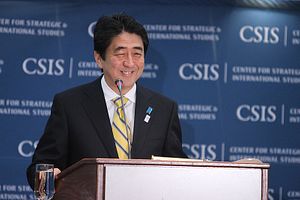U.S. President Donald J. Trump and Japanese Prime Minister Shinzo Abe have agreed to hold a summit in Washington, D.C., on February 10.
The meeting will be the first face-to-face meeting between the two leaders since Trump met Abe during the U.S. presidential transition shortly after his election victory in November 2016.
Abe confirmed the visit to reporters after his phone call with Trump last week.
According to a readout of the call from the White House, the two leaders discussed “the importance of the U.S.-Japan alliance and cooperation on regional and global issues.”
The White House readout further noted that Trump “affirmed the ironclad U.S. commitment to ensuring the security of Japan.”
“When we meet on February 10, I want to have a frank exchange of opinions on the economy and security,” Abe told reporters after the call. “I want to make it a meaningful exchange of opinions.”
Last week, after signing an executive order calling for the U.S. to withdraw unilaterally from the 12-country Trans-Pacific Partnership multilateral trade deal, Trump’s team pitched a plan to pursue several bilateral free trade agreements with stringent enforcement and withdrawal clauses.
“Believe me, we’re going to have a lot of trade deals,” Trump told a group of lawmakers from the Republican Party last week in Philadelphia.
“If that particular country doesn’t treat us fairly, we send them a 30-day termination, notice of termination.”
Trump’s unilateral decision on the Trans-Pacific Partnership has caused trepidation in Japan. Abe’s government and Liberal Democratic Party expended considerable political capital in pursuing the TPP.
A bilateral FTA with the United States with high standards could represent a similarly attractive outcome for the Abe government — particularly given that the United States and Japan represented an overwhelming majority of the GDP of the TPP states anyway.
Moreover, the idea of a bilateral U.S.-Japan FTA is an old idea that has been under serious discussion since at least the late 1980s.
The problem for Abe and Japan will be feeling out if Trump is a trustworthy counterparty for negotiating a bilateral trade deal.
Abe’s top priority will be preserving good U.S.-Japan ties and securing the alliance; fraught trade negotiations with an aggressive U.S. administration that is threatening the potentially capricious use of stringent termination clauses may be a difficult sell politically in Japan.

































